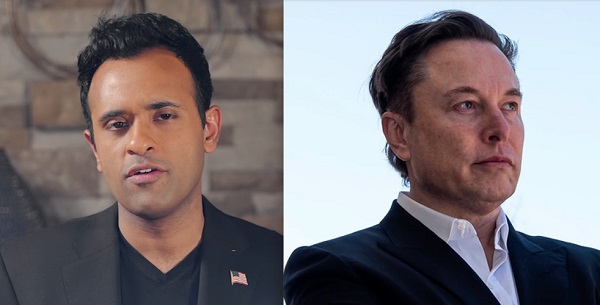International
Elon Musk, Vivek Ramaswamy Outline Sweeping Plan to Cut Federal Regulations And Staffing

 From the Daily Caller News Foundation
From the Daily Caller News Foundation
Elon Musk and Vivek Ramaswamy published an op-ed Wednesday in the Wall Street Journal that revealed their huge plans for the Department of Government Efficiency (DOGE).
Civil service protections won’t shield federal workers from mass layoffs, according to the op-ed. Musk and Ramaswamy outlined a sweeping plan to cut federal regulations and staffing, marking the most detailed glimpse yet into Trump’s downsizing strategy.
The pair, acting as “outside volunteers,” pledged to collaborate with Trump’s transition team to assemble a “lean team of small-government crusaders.” This team, they said, would work closely with the White House Office of Management and Budget to implement their vision.
The initiative focuses on three core objectives: cutting regulations, reducing administrative overhead, and achieving cost savings. Legal experts and advanced technology will help identify regulations that overstep congressional authority. These rules would be presented to Trump, who could halt enforcement and begin the repeal process through executive action.
BREAKING: Donald Trump has officially announced Elon Musk & Vivek Ramaswamy will lead Department of Government Efficiency (DOGE) pic.twitter.com/9WNn5FojN1
— Daily Caller (@DailyCaller) November 13, 2024
“A drastic reduction in federal regulations provides sound industrial logic for mass head-count reductions across the federal bureaucracy. DOGE intends to work with embedded appointees in agencies to identify the minimum number of employees required at an agency for it to perform its constitutionally permissible and statutorily mandated functions,” the op-ed revealed.
Musk and Ramaswamy acknowledged the impact of their plan and said displaced workers should be treated with dignity, proposing incentives like early retirement packages and severance pay to ease their transition into private-sector roles. Despite common assumptions, civil service protections won’t prevent these layoffs, they contended, as long as the terminations are framed as reductions in force rather than targeting specific employees.
Musk and Ramaswamy also advocated for relocating federal agencies out of Washington, D.C., and encouraging voluntary resignations from remote workers unwilling to return to the office full-time. “If federal employees don’t want to show up, American taxpayers shouldn’t pay them for the Covid-era privilege of staying home,” they said.
Ramaswamy said Tuesday that federal employees must return to the office full-time. He noted on X, previously known as Twitter, that unions are hastily revising agreements to prevent job losses, claiming the prospect of a five-day office schedule has left some “in tears.”
Trump announced that Musk and Ramaswamy will co-lead a newly created DOGE during his second term. The duo will work with the White House Office of Management and Budget to streamline federal agencies, reduce wasteful spending, and eliminate excessive regulations.
Daily Caller
AI Needs Natural Gas To Survive


From the Daily Caller News Foundation
By David Blackmon
As recent studies project a big rise in power generation demand from the big datacenters that are proliferating around the United States, the big question continues to focus in on what forms of generation will rise to meet the new demand. Most datacenters have plans to initially interconnect into local power grids, but the sheer magnitude of their energy needs threatens to outstrip the ability of grid managers to expand supply fast enough.
This hunger for more affordable, 24/7 baseload capacity is leading to a variety of proposed solutions, including President Donald Trump’s new executive orders focused on reviving the nation’s coal industry, scheduled to be signed Tuesday afternoon. But efforts to restart the permitting of new coal-fired power plants in the US will require additional policy changes, efforts which will take time and could ultimately fail. In the meantime, datacenter developers find themselves having to delay construction and completion dates until firm power supply can be secured.
Datacenters specific to AI technology require ever-increasing power loads. For instance, a single AI query can consume nearly ten times the power of a traditional internet search, and projections suggest that U.S. data center electricity consumption could double or even triple by 2030, rising from about 4-5% of total U.S. electricity today to as much as 9-12%. Globally, data centers could see usage climb from around 536 terawatt-hours (TWh) in 2025 to over 1,000 TWh by 2030. In January, a report from the American Security Project estimated that datacenters could consume about 12% of all U.S. power supply.
Obviously, the situation calls for innovative solutions. A pair of big players in the natural gas industry, Liberty Energy and Range Resources, announced on April 8 plans to diversify into the power generation business with the development of a major new natural gas power plant to be located in the Pittsburgh area. Partnering with Imperial Land Corporation (ILC), Liberty and Range will locate the major power generation plant in the Fort Cherry Development District, a Class A industrial park being developed by ILC.
“The strategic collaboration between Liberty, ILC, and Range will focus on a dedicated power generation facility tailored to meet the energy demands of data centers, industrial facilities, and other high-energy-use businesses in Pennsylvania,” the companies said in a joint release.
Plans for this new natural gas power project follows closely on the heels of the March 22 announcement for plans to transform the largest coal-fired power plant in Pennsylvania, the Homer City generating station, into a new gas-fired facility. The planned revitalized plant would house 7 natural gas turbines with a combined capacity of 4.5 GW, enough power 3 million homes.
Both the Homer City station and the Fort Cherry plant will use gas produced out of the Appalachia region’s massive Marcellus Shale formation, the most prolific gas basin in North America. But plans like these by gas companies to invest in their own products for power needs aren’t isolated to Pennsylvania.
In late January, big Permian Basin oil and gas producer Diamondback Energy told investors that it is seeking equity partners to develop a major gas-fired plan on its own acreage in the region. The facility would primarily supply electricity to data centers, which are expected to proliferate in Texas due to the AI boom, while also providing power for Diamondback’s own field operations. This dual-purpose approach could lower the company’s power costs and create a new revenue stream by selling excess electricity.
Prospects for expansion of gas generation in the U.S. received a big boost in January when GE Vernova announced plans for a $600 million expansion of its manufacturing capacity for gas turbines and other products in the U.S. GE Vernova is the main supplier of turbines for U.S. power generation needs. The company plans to build 37 gas power turbines in 2025, with a potential increase to over 70 by 2027, to meet rising energy demands.
The bottom line on these and other recent events is this: Natural gas is quickly becoming the power generation fuel of choice to feed the needs of the expanding datacenter industry through 2035, and potentially beyond. Given that reality, the smart thing to do for these and other companies in the natural gas business is to put down big bets on themselves.
David Blackmon is an energy writer and consultant based in Texas. He spent 40 years in the oil and gas business, where he specialized in public policy and communications.
International
Trump White House will ignore reporter emails that include ‘preferred pronouns’ in signature

From LifeSiteNews
“Any reporter who chooses to put their preferred pronouns in their bio clearly does not care about biological reality or truth and therefore cannot be trusted to write an honest story”
The White House will ignore all emails from reporters which include preferred gender pronouns in their email signatures according to Press Secretary Karoline Leavitt.
“Any reporter who chooses to put their preferred pronouns in their bio clearly does not care about biological reality or truth and therefore cannot be trusted to write an honest story,” Leavitt wrote in response to a request for comment from the New York Times.
The practice of citing one’s preferred gender pronouns, which is increasingly prevalent among leftists, stems from gender ideology, the idea that people have a “gender identity” that is distinct from their sex. Thus, for example, women who identify as males may include the gender pronouns “he/him” in their email signature or other identifiers.
Leavitt had previously stated to a NYT reporter who inquired about the potential closure of a climate research observatory, “As a matter of policy, we do not respond to reporters with pronouns in their bios.”
The New York Times reported that Katie Miller, senior advisor for the Department Of Government Efficiency (DOGE), had weeks prior declined another question from a Times reporter, for the same reason.
“As a matter of policy, I don’t respond to people who use pronouns in their signatures as it shows they ignore scientific realities and therefore ignore facts,” Miller said in an email. In a separate message, she noted, “This applies to all reporters who have pronouns in their signature.”
-

 2025 Federal Election2 days ago
2025 Federal Election2 days agoRCMP memo warns of Chinese interference on Canadian university campuses to affect election
-

 2025 Federal Election1 day ago
2025 Federal Election1 day agoResearchers Link China’s Intelligence and Elite Influence Arms to B.C. Government, Liberal Party, and Trudeau-Appointed Senator
-

 Energy2 days ago
Energy2 days agoTrump signs four executive orders promoting coal industry
-

 COVID-191 day ago
COVID-191 day agoFauci, top COVID officials have criminal referral requests filed against them in 7 states
-

 Business2 days ago
Business2 days agoTrump raises China tariffs to 125%, announces 90-day pause for countries who’ve reached out to negotiate
-

 2025 Federal Election6 hours ago
2025 Federal Election6 hours agoWhat Trump Says About Modern U.S. And What Carney Is Hiding About Canada
-

 Business2 days ago
Business2 days agoStocks soar after Trump suspends tariffs
-

 Business2 days ago
Business2 days agoScott Bessent Says Trump’s Goal Was Always To Get Trading Partners To Table After Major Pause Announcement









